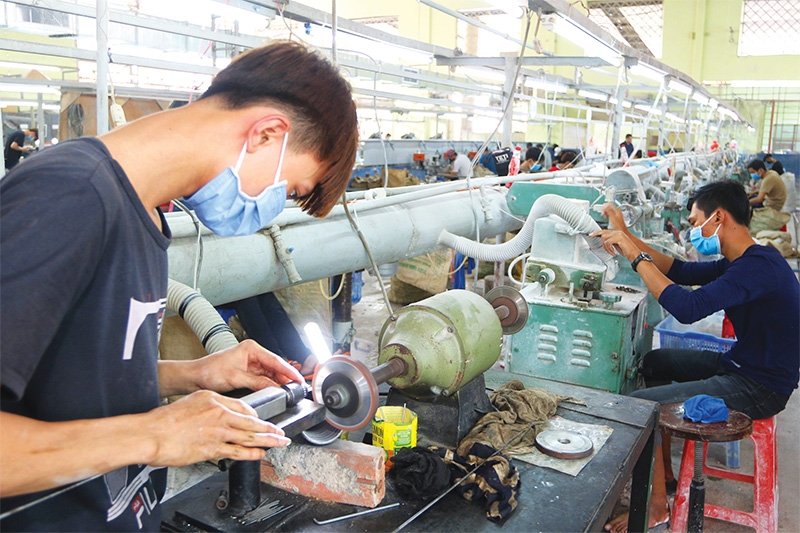Enterprise support around the corner
 |
| Sectors that are heavily affected by the global health crisis will earn new incentives. Photo: Le Toan |
After a series of proposals from experts and the business community, it is expected that Prime Minister Nguyen Xuan Phuc will issue a hallmark directive on measures to support enterprises in adapting to the ongoing novel coronavirus, or COVID-19, outbreak and ensure economic growth for 2020.
The directive, compiled by the Ministry of Planning and Investment (MPI), will likely include special incentives for enterprises, especially those operating in industry, agriculture, and tourism. The most heavily hit sectors of COVID-19, they will get incentives during and after the epidemic. These may involve a reduction and exemption of many types of fees and taxes, and ease of customs clearance procedures. The State Bank of Vietnam is expected to ask banks to reschedule debt payment time, reduce or exempt lending rates, and provide new loans with preferential lending rates.
“This directive is extremely important as it is expected to give the kiss of life to enterprises suffering numerous difficulties caused by COVID-19,” said MPI Minister Nguyen Chi Dung at last week’s MPI meeting to seek out solutions to assist enterprises amid the global health crisis. “The solutions must help enterprises recover performance and the economy bounce back, with growth [of 6.8 per cent] maintained for 2020 and the whole 2016-2020 period [of 6.5-7 per cent annually],” Minister Dung said. “I am really worried about the health of enterprises. If enterprises continue suffering great losses as they are now, the economy will suffer reductions in budget revenue, growth, employment, and social disorder.”
Depressed production
The government’s new move comes amid many enterprises in the country seriously affected by woes caused by COVID-19, and with many neighbouring nations having launched different packages to assist businesses to recover production.
Tran Duy Dong, head of the MPI’s Department for Local and Territorial Economy, said that production enterprises are in critical need of support in reducing input costs and seeking out markets, and extension of tax payments. Meanwhile, tourism firms need assistance in visa extensions, promotion of tourism programmes, and reduction of air tickets. Agricultural firms also require assistance in product consumption in the local market.
The minister and business associations have directly met with enterprises, with those in industries such as textiles and garments, electronics, automobiles, and agriculture noting that the government would need to have sturdy policies to support them. Many are facing tough difficulties due to a shortage of materials, of which 30-60 per cent are imported from China.
“Currently, firms’ material stock can help them maintain production until late February. If their shortages continue, they must halt production in March,” Minister Dung said.
The German Industry and Commerce Vietnam carried out a survey of over 80 German firms in Vietnam on the COVID-19 impacts on their operations. Some 76 per cent of respondents confirmed that the epidemic is affecting their activities in Vietnam. About 44 per cent highly valued the Vietnamese government’s timely measures against the outbreak, helping them in performance.
According to the MPI’s Foreign Investment Agency (FIA), numerous international firms in Vietnam have been heavily affected by the unpredictability caused by COVID-19. For example, Taiwanese-backed Foxconn is anxious with its serious lack in both material supplies and experts. Foxconn is a supplier of Apple, Cisco, and Google.
“A new huge project and contracts of Foxconn with partners have been heavily affected, and the situation will become even worse if Foxconn’s experts are not allowed to enter Vietnam,” said FIA head Do Nhat Hoang. “Foreign business associations told us that their materials are only sufficient until late February, and in March, their performance will be more affected.”
The MPI’s Department of Economic Zone Management also reported that thousands of enterprises in economic zones are operating in the production sector, and are facing serious material shortages.
“Major firms such as Foxconn, Formosa, and Samsung can ensure their materials until March. Besides that, enterprises are suffering from grave shortages of employees,” said department director Nguyen Thi Bich Ngoc. “Hoa Phat, Samsung, and Foxconn are lacking technical workers.”
Damaging growth
According to Jacques Morisset, the World Bank’s lead economist in Vietnam, it is expected that COVID-19 could lead to a 5 per cent reduction in GDP each month if the epidemic continues. In 2020, the whole economy may suffer from a 1.4 per cent drop in GDP growth. Morisset suggested that to spur on local production and ensure economic growth, the Vietnamese government should not use too many tools, which can make it difficult to manage. He added that it is advised Vietnam use tax-related methods such as rescheduling payments and refunds which are now critically needed by enterprises.
Meanwhile, Standard Chartered Bank has launched a report on gauging exposure to coronavirus disruptions in Asia, forecasting that it has lowered its 2020 GDP growth projection for Vietnam to 6.6 from 7 per cent. “We expect the coronavirus to have the greatest impact on manufacturing, Vietnam’s strongest growth driver in recent years. The impact is likely to be concentrated in the first quarter – when we see growth slowing to 4.5 per cent on-year, with activity rebounding in the first half of the year,” the report read. “The manufacturing sector has registered double-digit growth for the last five years, contributing close to a third of overall growth. We expect manufacturing growth to slow to nearly 8 per cent in 2020 from 11.3 per cent in 2019.”
“We expect the government to deliver fiscal stimulus via accelerated disbursement of funds for public investment and measures (including tax incentives) to attract foreign direct investment inflows.”
With this new forecast, Vietnam’s growth this year will still be the highest in the region, with Standard Chartered also lowering growth projections for many economies such as China (5.5 per cent), Hong Kong (-1.5 per cent), Indonesia (5 per cent), Malaysia (4.2 per cent), Singapore (0.8 per cent), South Korea (2 per cent), Taiwan (1.9 per cent), Thailand (1.8 per cent), and Japan (0.4 per cent).
Last week, global analysts FocusEconomics also released its new forecast on Vietnam’s economic outlook, stating that the economy is set to “remain one of ASEAN’s top performers in 2020 thanks to strong domestic demand.”
However, COVID-19 will hamper momentum in the short-term, the forecast said. “A possible escalation of the viral outbreak and domestic banking vulnerabilities pose further risks to the outlook,” the firm stated in a fresh bulletin sent to VIR. “FocusEconomics panellists project the economy will expand 6.5 per cent in 2020, which is down 0.1 percentage points from last month’s forecast, and 6.6 per cent in 2021.”
At a government-led meeting last week, PM Phuc stated that the government will support all sectors in the economy via numerous measures such as a reduction in visa fees, no increase in prices of power, water, healthcare, and educational services, and many others. “Another solution is we must boost public investment and construction of key projects, as well as accelerate disbursement of official development assistance, foreign investment, and development capital,” PM Phuc noted.
Actions by nations
As of last Saturday, COVID-19 has it 50 nations and territories around the world. Many have taken sturdy solutions to keep their enterprises and economies afloat. For example, China has increased money supply worth $240 billion into the banking system, and the banks are required to provide preferential loans for enterprises and people. All loaning procedures are simplified. Meanwhile, Thailand has just announced new measures to fuel its economy, with a reduction in average annual lending rate from 1.25 to 1 per cent, and a rise in corporate income tax exemption for enterprises and large-scale projects, as well as loosening of debt payments.
Singapore has announced a package worth over $4 billion to support the economy, including exemption of many fees for the hospitality sector. Moreover, the Philippines has also reduced its average annual lending rate from 4 to 3.75 per cent for borrowers. Indonesia has also followed suit, from 5 to 4.75 per cent.
According to Minister Dung, the packages by these economies are aimed to implement specific purposes.
“Thus, Vietnam must also have a suitable package to support our enterprises. We must make a list on the types of enterprises that must be given incentives. We cannot support all enterprises at the same time as not all enterprises are affected by COVID-19,” he said. “We do hope that with the new policy from the Vietnamese government, enterprise confidence will be strengthened, and economic growth targets will be ensured.”
| Nguyen Minh Cuong - Principal country economist, Asian Development Bank Vietnam
The COVID-19 outbreak is spiraling into a new stage in which there are growing number of cases in South Korea, Iran, and Italy. It is too early to quantify the economic impact on Vietnam. However, when China, South Korea, and Japan – the principal trade and investment partners of Vietnam – are all affected, risks to Vietnam’s economy would be intensified toward the downside. The impact appears across the board, with almost all areas of supply and demand affected such as tourism, exports-oriented agriculture and manufacturing, transportation, logistics, and domestic consumption. If the outbreak persists to the second quarter, the slowdown could be sharper. However, there are still bright spots. The economic fundamentals stay resilient and the drivers of economic growth – growing middle-income class, and dynamics private sector, notably small- and medium-sized enterprises and household business – remain robust. Economic measures to be taken therefore should not only aim to respond to the economic impact in the short term, but more importantly to preserve the drivers of growth in the long-term, including facilitating structural reforms, so that Vietnam is ready to fully capture the benefits of the rebound when COVID-19 subdues. |
What the stars mean:
★ Poor ★ ★ Promising ★★★ Good ★★★★ Very good ★★★★★ Exceptional
Themes: COVID-19
- 67 million children missed out on vaccines because of Covid: UNICEF
- Vietnam records 305 COVID-19 cases on October 30
- 671 new COVID-19 cases recorded on October 1
- Vietnam logs additional 2,287 COVID-19 cases on Sept. 21
- People’s support decisive to vaccination coverage expansion: official
Related Contents
Latest News
More News
- Foreign leaders extend congratulations to Party General Secretary To Lam (January 25, 2026 | 10:01)
- 14th National Party Congress wraps up with success (January 25, 2026 | 09:49)
- Congratulations from VFF Central Committee's int’l partners to 14th National Party Congress (January 25, 2026 | 09:46)
- 14th Party Central Committee unanimously elects To Lam as General Secretary (January 23, 2026 | 16:22)
- Worldwide congratulations underscore confidence in Vietnam’s 14th Party Congress (January 23, 2026 | 09:02)
- Political parties, organisations, int’l friends send congratulations to 14th National Party Congress (January 22, 2026 | 09:33)
- Press release on second working day of 14th National Party Congress (January 22, 2026 | 09:19)
- 14th National Party Congress: Japanese media highlight Vietnam’s growth targets (January 21, 2026 | 09:46)
- 14th National Party Congress: Driving force for Vietnam to continue renewal, innovation, breakthroughs (January 21, 2026 | 09:42)
- Vietnam remains spiritual support for progressive forces: Colombian party leader (January 21, 2026 | 08:00)


 Tag:
Tag:




















 Mobile Version
Mobile Version